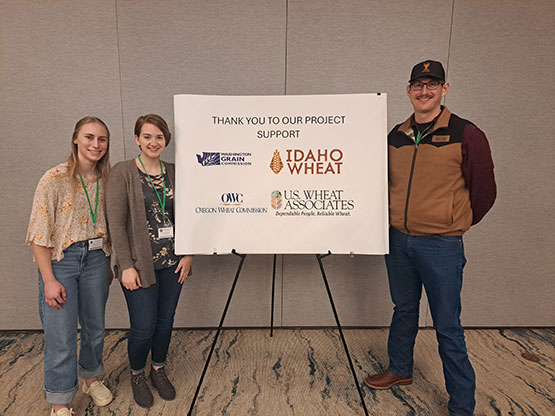Students showed their work at the annual PNW Wheat Quality Council meeting
On Jan. 29, the annual Pacific Northwest Wheat Quality Council meeting kicked off in Portland, Ore. With thanks to the Idaho, Oregon, and Washington grain commissions, there were a few more students in attendance than years past. Each state commission provided full funding for a deserving undergraduate or graduate student pursuing a career relevant to the wheat industry to attend. Congratulations to our scholarship recipients!

MADISON (MADI) WEBER is a sophomore at the University of Idaho, earning a degree in agricultural education and is “excited to pursue a career that can enrich our future leaders in agriculture” after graduation. Weber is from Eastern Washington and grew up on her family’s multigeneration wheat farm where she developed her love for agriculture working with her father, uncle, and grandmother. When asked about the biggest challenge in the future of the wheat industry, Weber replied, “From my own experience, I have seen that the biggest challenge is for smaller operations to remain profitable. It is important that we feed our world, no matter how that will look, but I will always be passionate about continuing the American tradition of family farming.”
DALTON JONES is a graduate student attending Oregon State University earning his doctorate in plant breeding and genetics with Margaret Krause and hopes to become a wheat breeder after graduation. Jones’ research includes integrating genomic selection models with high-throughput phenotyping to improve wheat yield and end-use quality. Jones is from Utah, just north of Salt Lake City, and earned his undergraduate degree in botany. His favorite class was molecular biology where he was able to use confocal microscopy to visualize gene expression, which solidified his “passion for genetics.” After receiving his undergraduate degree, he moved to Montana and began working with his uncle, which started his interest in plant breeding. When asked about the most interesting thing he has learned about wheat, Jones replied, “I love the complex evolutionary history of wheat.”
ANNA CARROLL is a graduate student attending Washington State University earning her master’s in crop and soil sciences with Amber Hauvermale and hopes to work abroad in research related to sustainable agriculture after graduation. Carroll’s research includes validation of the new falling number rapid test and identifying crop management strategies to help prevent low falling numbers. Carroll was born in California but moved to Western Washington when she was a preteen. In 2020, she “began pursuing my dream of going back to school,” and studied environmental sciences before coming to Pullman. When asked about the most interesting thing she has learned about wheat, Carroll replied, “that wheat accounts for about 20% of all calories consumed by humans. It helped put into perspective just how important wheat is to global food security.”
The article originally appeared in the March 2025 issue of Wheat Life Magazine.
